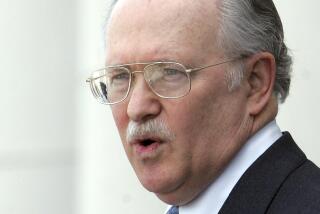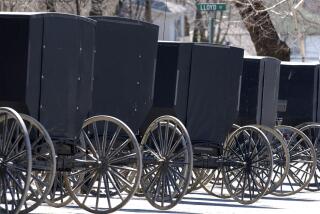Supreme Court to revisit church-state separation
WASHINGTON — The Supreme Court has agreed to revisit the issue of church-state separation and decide whether a town council can begin most of its monthly meetings with a prayer from a Christian pastor.
Thirty years ago, the court upheld a state legislature’s practice of beginning its session with a nondenominational prayer. The justices said that “to invoke divine guidance on a public body entrusted with making laws” did not violate the 1st Amendment’s prohibition on an “establishment of religion.”
But since then, several lower courts have said that a city council or county board may violate the 1st Amendment if its opening prayers favor one religion.
Last year, the U.S. 2nd Circuit Court of Appeals ruled that the town of Greece, N.Y., near Rochester, had crossed the line by inviting Christian pastors to deliver nearly every opening prayer. Though the town’s policy does not favor one religion, the appeals court said its practice had been to favor Christianity to the exclusion of other faiths.
“In practice, Christian clergy members have delivered nearly all of the prayers relevant to this litigation and have done so at the town’s invitation,” the appeals court said.
Lawyers for the town appealed to the Supreme Court, arguing that opening prayers are a standard practice at town councils and county boards across the nation.
Ken Klukowski, a lawyer with the Family Research Council, a conservative Christian group, predicted the court would “not only affirm prayer but significantly strengthen the religious liberty rights of Americans in public life and in the public square.”
But the Rev. Barry Lynn, executive director of Americans United for Separation of Church and State, urged the high court to “affirm government neutrality on religion. A town council meeting isn’t a church service, and it shouldn’t seem like one,” he said. His group represented Susan Galloway and Linda Stephen, two local residents who objected to the monthly prayers.
The court said it would hear the case in the fall. The justices took no action on another pending religion case, about whether a public high school could hold its graduation ceremony in a church.
The justices also agreed to hear a search case from Los Angeles and to decide whether disgruntled “frequent fliers” can sue an airline.
Walter Fernandez, who was sentenced to 14 years in prison for robbery and gun crimes, objected to the search of his apartment. A girlfriend had consented to the search after police arrested him and took him away. The court will decide whether such a search is legal.
Rabbi Binyomin Ginsberg was a frequent flier on Northwest Airlines who sued the airline in San Diego after he was dropped from its “World Perks” program in 2008. Northwest has urged the Supreme Court to throw out the suit on the grounds that the federal Airline Deregulation Act bars claims in a state court over a “rate, route or service” of an air carrier.
More to Read
Start your day right
Sign up for Essential California for news, features and recommendations from the L.A. Times and beyond in your inbox six days a week.
You may occasionally receive promotional content from the Los Angeles Times.







